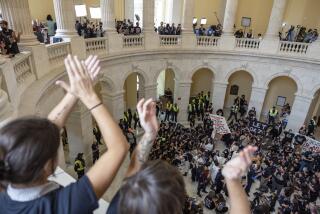Yeltsin Dealt a Thrashing in Russia Congress
- Share via
MOSCOW — Russian Federation lawmakers gave their leader, Boris N. Yeltsin, a sound political thrashing Monday, repeatedly refusing to create the powerful new presidency he seeks and calling for a vote of no confidence in his administration.
The new challenge to Yeltsin’s leadership highlighted the internal struggle that the radical populist must face inside the sprawling Russian Federation even as he remains locked in a bitter national rivalry with Soviet President Mikhail S. Gorbachev.
As part of a continuing attack from within the Russian leadership, one of the lawmakers, Boris Isayev, accused Yeltsin of being intent on bolstering his personal power, using his vast popularity as a lever.
“It’s a very strange phenomenon,” Isayev said. “The worse life gets, the greater Yeltsin’s popularity gets.”
He complained that Yeltsin has branded as an enemy anyone who dares to oppose him, and he called for the Congress of People’s Deputies, the Russian Federation’s 1,060-member Parliament, to vote on whether the entire Russian leadership should resign.
Another deputy, frustrated by lawmakers’ inability to break the political deadlock between Communist Party conservatives and radical Yeltsin supporters, said that unless Yeltsin can pull the unwieldy Parliament into shape, he should resign and leave it to someone who could.
“I want to hear it from your lips, Boris Nikolayevich,” he told Yeltsin. “Can you consolidate the deputies or not?”
Yeltsin did not flinch at that and other challenges, saying only that he thought all such questions should be postponed until the end of the parliamentary session. It originally planned to adjourn today but probably cannot given the volume of work remaining.
The calls for Yeltsin’s resignation brought cries for and against the proposal from the raucous floor, but the issue of the powerful Russian Federation presidency that he seeks to establish brought far greater dissent, triggering hour after hour of debate and exposing the deep schism that divides the lawmakers.
About three-quarters of voters in the Russian Federation, the Soviet Union’s largest republic, backed the creation of a directly elected Russian presidency in a March 17 referendum. But at the Congress, no matter how Yeltsin’s backers formulated and reformulated the question, they fell dozens of votes short of the 532 needed for a majority.
They were blocked at every vote by a mix of conservatives and independent deputies who, judging by their comments in the lobbies, are not ready to trust Yeltsin with additional powers.
Frustrated, some left-wingers proposed dissolving the Congress as “unable to carry out the will of the people” and calling new elections. Several shouted for a hunger strike.
One of Yeltsin’s supporters, Ruslan Khasbulatov, delved into the deeper problems the Russian leadership faces with a report on the treaty currently being forged between the republic’s leadership and the dozens of smaller units that make up the Russian Federation.
Like Gorbachev, who is trying to hold together the Soviet Union’s 15 republics, Yeltsin is working to keep the Russian Federation at its current mammoth size, stretching from the Baltic Sea to the Pacific Ocean, with a population of almost 150 million.
Khasbulatov said the Russian government must reach a new “treaty of the federation” with a total of 89 units, a hodgepodge of entities known as autonomous republics, areas, regions, territories and administrative districts, many of which are demanding independence from Russian jurisdiction.
One element of the festering conflict between Yeltsin and Gorbachev is the fight for control of these smaller Russian units, faraway places such as Tatarstan, Komi, Tuva and Bashkiria.
If a unit decides to declare itself a full-fledged subject of the Soviet Union and signs a treaty directly with Gorbachev’s central government, it could be effectively lost to Yeltsin and his Russian Federation’s control.
Khasbulatov pushed for the basic principles of the treaty to be worked out within a month.
More to Read
Sign up for Essential California
The most important California stories and recommendations in your inbox every morning.
You may occasionally receive promotional content from the Los Angeles Times.













